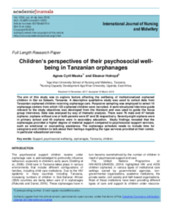The aim of this study was to explore factors affecting the wellbeing of institutionalized orphaned children in Dar es Salaam, Tanzania. A descriptive qualitative study was used to collect data from Tanzanian orphaned children receiving orphanage care. Purposive sampling was employed to select 10 orphanage centers from which 123 orphaned children were recruited. A semi-structured interview guide relevant to the study objectives was developed from the literature and was used to guide the focus group interviews. Data was analysed by way of thematic analysis. There were 76 male and 47 female orphans; orphans without one or both parents were 87 and 36 respectively. Seventy-eight orphans were in primary school and 45 orphans were in secondary education. Study findings revealed that the orphanages provided a higher degree of material support compared to psychosocial support services, such as emotional or counselling assistance. The orphanage schedule needs to include time for caregivers and children to talk about their feelings regarding the type services provided at their center, in particular educational services.

